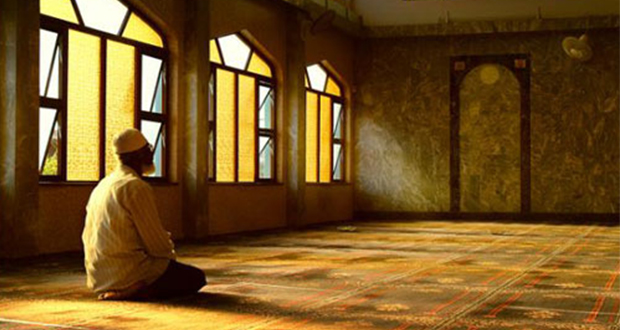As we are in the last 10 nights of Ramaḍān, and we are nearing the end of this blessed month, it is important for us to maximise whatever little time we have left of this sacred month and the virtuous 10 nights, which are the best 10 nights of the year. Some of us who are able to, perform iʿtikāf in these 10 nights and try to use this as a way of drawing closer to our Lord. However, though most of us may not have the opportunity to perform the full iʿtikāf, we should not let that get in the way of us drawing closer to our Lord or put us off exerting our efforts in trying to gain the pleasure of Allāh (subḥānahu wa taʿālā).
Also Read: Countdown to the Night of al-Qadr
Whether we perform iʿtikāf or not, we should try to seclude ourselves from others as much as possible, without forsaking the rights of the spouse or family of course. If we cannot seclude ourselves physically, then let us at least try to seclude ourselves spiritually so we are always thinking about Allāh (subḥānahu wa taʿālā) and not indulging in anything that diverts us away from Him, whilst hoping to gain the reward of iʿtikāf because we were only prevented from doing it due to the commitments and responsibilities we have. Let us be sincere in doing that, so we aim to stay awake the whole night as if we are in iʿtikāf, increasing in our worship and devotion to Allāh (subḥānahu wa taʿālā).
In order to gain the best of these 10 nights, let us feel we are in iʿtikāf, whether we are in the masjid, at home, at work, or even during our commute. What follows are golden tips and points to consider for people wishing to be in this state, extracted and reworded from a reminder given by Shaykh Muhammad b. Muhammad al-Mukhtār al-Shinqīti. Let us try to implement them whether we are secluding ourselves in the masjid or elsewhere.
The seclusion should be in a perfect manner. For whoever achieves this, he will have peace of heart, and therefore will have his sins forgiven and have all forms of good open before him. In doing so a person should feel that the dunyā, with all of its beauty will never stand between them and their Lord, and that all of the profits in the dunyā do not compare with the profits with their Lord.
We spend 300 or so days working for the dunyā and dealing with it, so we should feel we are in need of some time to devote ourselves to our Lord, to cry before Him, humble ourselves before Him, and supplicate to Him. We can achieve this by leaving all of the worries of the dunyā for one worry, which is the worry or concern of pleasing our Lord.
We should feel heavy, full of sins, so when we leave our house we should do so with the intention of escaping from this dunyā and family to complain to Allāh (subḥānahu wa taʿālā) of our sins and shortcomings. We should feel our footsteps towards the masjid heavy from sins and shortcomings, and enter hoping for the reward for Allāh (subḥānahu wa taʿālā).
As we enter the masjid and commence our seclusion—for whatever time period—we should forget about all of our worries and concerns. Be sincere with Allāh (subḥānahu wa taʿālā), and know that He does not accept things except those that are for His sake. Try and hope from the bottom of your heart that no other human being knows you are there so that your seclusion is sincerely for Allāh (subḥānahu wa taʿālā).
Know that we did not depart from our families to indulge in conversations, rather we have left what we love, for that which is more beloved to our hearts – Allāh (subḥānahu wa taʿālā) – so the most despised thing is when someone talks about the dunyā when in seclusion with Him.
If we are truthful and sincere to Allāh (subḥānahu wa taʿālā), He will allow us to witness and worship Him in Laylat al-Qadr, in shā’ Allāh. Some people prepare for it and are sincere in their objective and want to improve, so they leave with the ability to read the Qur’ān every three days. Some leave with the ability to contemplate over the Qur’ān, crying when listening to it. Some leave with the habit of fasting on Mondays and Thursdays.
We should look for the best of companionship if we feel a need for companionship, otherwise, the objective is to separate ourselves from the creation of Allāh (subḥānahu wa taʿālā), for a short period of time at least.
Know that none are more generous, kind, and merciful than Allāh (subḥānahu wa taʿālā). When you are a guest at someone’s house, they treat you well, so how about when you are a guest in His house? Who knows, you may leave with great happiness and spiritual uplift that is not matched by anything like it. Who knows, He may look at you in a moment whilst you are humble and crying before Him, so He guides and protects you so you never fall astray. Who knows, Allāh (subḥānahu wa taʿālā) may look at you at a moment whilst you are humble and crying before Him, so He forgives you and frees you from Hellfire. Allāh (subḥānahu wa taʿālā) forgives the sinner whilst he is far from Him and may have not turned to Him, so how would He be with the one who visits His house and devotes himself to Allāh (subḥānahu wa taʿālā), then asks Him for forgiveness?
As such, we should stand in a broken, humble needy state before Allāh (subḥānahu wa taʿālā), whilst feeling that we stand before a merciful generous loving Lord, and with hands raised in supplication to Him, ask Him for forgiveness, supplicating for our parents and family, and for the whole Muslim ummah. How much of a great happiness will we attain if this duʿā’ is accepted?
Whether you are performing iʿtikāf or are secluding yourself in worship on a nightly basis, let us strive to make the most out of this short period of intensity, so that it has a lasting effect on us.
[donationbanner]
Source: www.islam21c.com
Many of the above notes have been extracted from this clip https://www.youtube.com/watch?v=OfG1F9oOwfs










Ramadan is not about skipping Meals! aor arranging ifttar parties on sea shores, tourist places as our brother khalid Beigh puts it,”Ramadan is the spring season for goodness and virtues when
righteousness blossoms throughout the Muslim communities.Ramadan offers a comprehensive program for our spiritual overhaul. The entire program required the peace and tranquility,submission of opnwis tone- we have no confesion boxes in faith islam w=once a fasting person submits to Allah in seclusion .without being watched by creation -sincere noble way ..with humility ..“Anyone who fasts during this month with purity of belief and with expectation of a good reward (from his Creator), will have his previous sins forgiven,” said the Beloved Prophet Muhammad (Peace and Blessings upon him). Anyone who stands in prayers during its nights with purity of belief and expectation of a reward, will have his previous sins forgiven.” As other AHadith tell us, the rewards for good deeds are multiplied manifold during Ramadan.Islam does not approve of monasticism. It does not ask us to permanently isolate ourselves from this world, since our test is in living here according to the Commands of our Creator. But it does ask us to take periodic breaks from it. The mandatory Salat (five daily prayers) is one example. For a few minutes everyday, we leave the affairs of this world and appear before Allah to remind ourselves that none but He is worthy of worship and of our unfaltering obedience. Ramadan takes this to the next higher plane, providing intense training for a whole month.
This spirit is captured in I’tikaf, a unique Ibada associated with Ramadan, in which a person gives up all his normal activities and enters a mosque for a specific period. There is great merit in it and every Muslim community is encouraged to provide at least one person who will perform I’tikaf for the last ten days of Ramadan. But even those who cannot spare ten days are encouraged to spend as much time in the mosque as possible.Brother “khalid Beigh in “Ramadan is not about skipping Meals!..jazzakaallaahukhair
Beautiful article